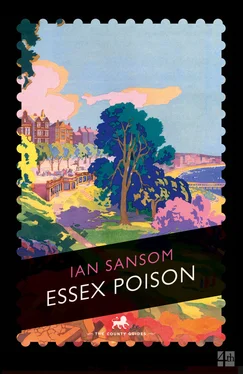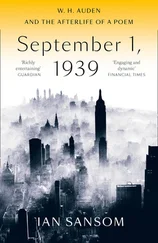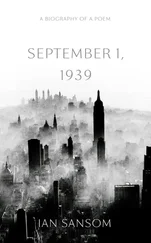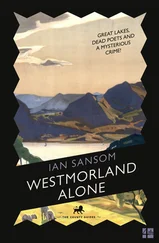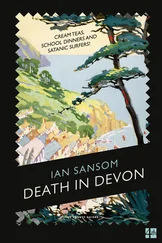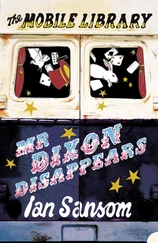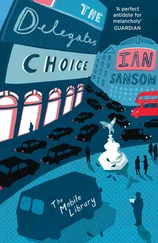
4th Estate
An imprint of HarperCollins Publishers
1 London Bridge Street
London SE1 9GF
www.4thEstate.co.uk
This eBook first published in Great Britain by 4th Estate in 2017
Copyright © Ian Sansom 2017
Cover image © Science & Society Picture Library / Getty Images
Ian Sansom asserts the moral right to be identified as the author of this work
A catalogue record for this book is available from the British Library
All rights reserved under International and Pan-American Copyright Conventions. By payment of the required fees, you have been granted the non-exclusive, non-transferable right to access and read the text of this e-book on-screen. No part of this text may be reproduced, transmitted, down-loaded, decompiled, reverse engineered, or stored in or introduced into any information storage and retrieval system, in any form or by any means, whether electronic or mechanical, now known or hereinafter invented, without the express written permission of HarperCollins
Source ISBN: 9780008146740
Ebook Edition © January 2017 ISBN: 9780008147068
Version: 2017-11-14
To Trinity
I come not from Heaven but from Essex.
WILLIAM MORRIS, A Dream of John Ball (1888)
Contents
Cover
Title Page
Copyright
Dedication
Epigraph
Chapter 1: London, Underground
Chapter 2: In the Oven
Chapter 3: The Rendezvous
Chapter 4: The Music Writers’ Mutual Publishing Co.
Chapter 5: A Topographical Cremeschnitte
Chapter 6: The Boulevards of Becontree
Chapter 7: This is England
Chapter 8: The Dagenham Girl Pipers
Chapter 9: The Role of Pageantry
Chapter 10: The Oyster’s Lonely Subterraqueous Sigh
Chapter 11: The Aviatrix
Chapter 12: Bluebeard’s Castle
Chapter 13: A Kind of Knocking
Chapter 14: A Mechanical Aphrodisiac
Chapter 15: What Have the Romans Ever Done for Us?
Chapter 16: Flitration & Purtefication
Chapter 17: An Average Essex Affray
Chapter 18: A Few Discreet Enquiries
Chapter 19: Loose Screw
Chapter 20: The ‘Cottaging’ Existence
Chapter 21: Proof! Proof!
Chapter 22: Kursaal
Chapter 23: Up and Down and Round and Round
Chapter 24: Oil and Dirt
Chapter 25: In the Trenches
Chapter 26: Jumbo
Chapter 27: Paradise, Norfolk
Acknowledgements
Picture Credits
Keep Reading …
About the Author
Also by Ian Sansom
About the Publisher
CHAPTER 1
LONDON, UNDERGROUND
BERRAK THE TURK was busy smoking narghile and reading the newspaper while simultaneously dispensing hot sweet mint tea from the tarnished silver urn perched on the edge of the counter. He was dressed as always in a wrinkled white shirt and was seated on the long, low lumpy leather sofa that served as his office and command centre, old newspapers and his dictionary piled beside him, an enamel bowl of sugar cubes and bright green mint leaves close to hand. The wall behind him was exposed brick, painted a mottled pale blue, presumably intended to resemble a clear summer day. But the wall oozed and trickled silently with damp, making it look rather more like a mourning sky in autumn. The dusty bookcase beside the desk was piled high with worn and ragged towels and beneath the hiss and glare of the crooked gas chandelier hung a stained board marked with prices: the prices never changed and bore no resemblance to what you paid. The gramophone was playing a scratchy ’78 of classical classics, the same record that was always playing, ever since I had been coming; there was no other record. Rachmaninoff’s Prelude in C-sharp minor; even I knew that the second movement of Mozart’s Piano Concerto No. 20 was about to follow. I wondered if Berrak ever grew tired of it. He showed no signs of doing so.
‘ Selam ! Selam ! Mr Sefton, you are back. You have returned! Nasilisiniz ? We haven’t seen you for so long.’
I had been away with Morley and Miriam in Westmorland, where things, it must be admitted, had not gone entirely to plan. For every good memory from those years there is always something else, something that can’t be avoided or denied: some death or disaster, some terrible discovery or disappointment. I’d learned in Spain that dread and despair are constant companions to adventure and during my time with Morley, for all its good, it often felt as though I were somehow being buried alive in yet more bad memories and that there was no escape. I had to do everything and anything to help me breathe.
‘Mr Sefton!’ continued Berrak. ‘It is very good to see you. Very very good.’ He shook me warmly by the hand. At least Berrak never changed. ‘My uncle was asking about you.’ He offered me tea. ‘Smoke?’ I declined both the tea and the smoke. ‘Uncle will be pleased.’
Berrak’s uncle was not his actual uncle. He may well have had a dozen actual uncles back home in Turkey but his English uncle was a Mr Klein, the owner of the Russian Turkish Baths and Berrak’s employer. I had met Klein on a number of occasions. We’d got on well. He was an educated man – neither Russian nor Turkish nor indeed English but from Poland, via Hackney – tiny, barely feet five tall, and fascinated by literature and by art, and with almost as many opinions as he had business interests. Klein made and sold his own rouges and fragrances (‘Klein’s Perspiration-Proof Make-Up’), he made and sold wigs (formed of real human hair), he ran a chain of haberdashers and hairdressers (patronised by the stars of British cinema), he rented properties and owned part shares in cinemas (including the beautiful old Capitol cinema in Winchmore Hill), he sold furs and jewellery, and he had the baths. He was a businessman in the very broadest sense. When I had first returned from Spain he had been kind enough to offer me work in the import and export branch of one of the businesses based down at St Katharine Docks, but I had been unable to take him up on the offer – not being in a fit state at the time to do anything but patronise his baths and go drinking. Sometimes I wondered what my life might have become if I had thrown in my lot with Mr Klein rather than with Morley. Things might have worked out better – or maybe not. Different, certainly.
‘It is very delighted to see you, Mr Sefton,’ said Berrak. He was paid to make people feel welcome, of course, but, nonetheless, he was good at his job. ‘We are all very glad to see you! I will tell Mr Klein you were here. Immediately, hereupon and in a jiffy.’
I had known Berrak for two or three years. I knew nothing about him except that he was a keen student of the English language and was always eager to try out the new words that he learned from his dictionary and from the newspapers.
‘Some people came here asking for you.’
‘When?’
‘Today. Yesterday. The foretimes.’
‘Did they say who they were?’
‘They said they were your friends.’
‘I see. What did they look like?’
Berrak shrugged his shoulders. The narghile didn’t only contain tobacco.
‘Was it a man and a woman?’
Berrak shrugged again. He could be intolerably vague, as well as unconditionally welcoming; perhaps the two things were related. He was in many ways the perfect doorman and receptionist, though one wouldn’t want to have relied on him as a witness. I paid my money and he handed me a greasy metal token and a threadbare towel that had perhaps once been royal blue but which was now a very definite shade of grey.
Читать дальше
